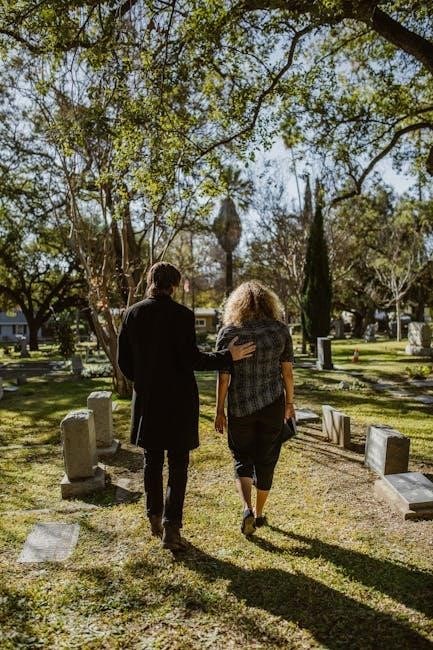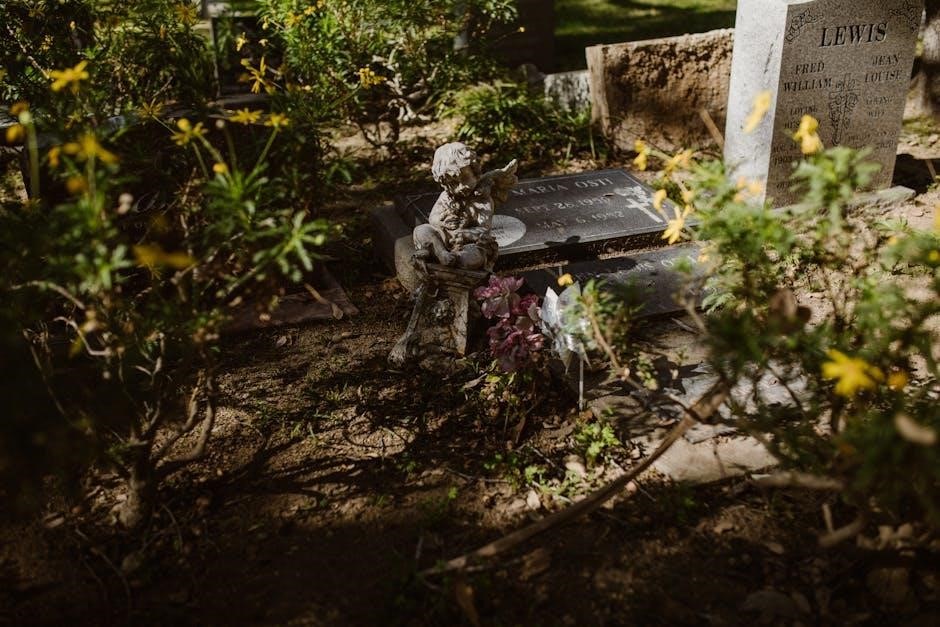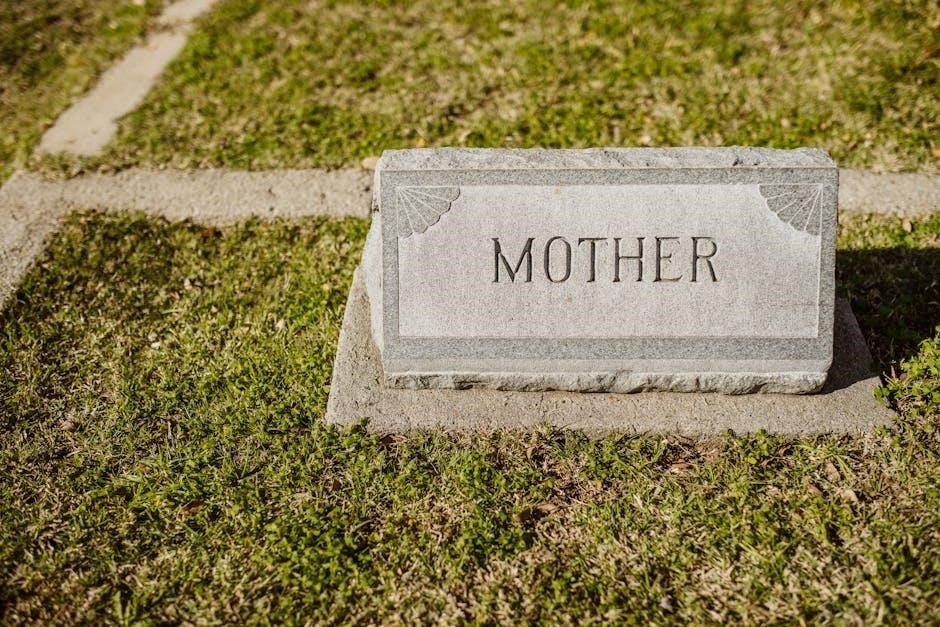Jessica Waite’s memoir, The Widow’s Guide to Dead Bastards, is a raw, unflinching exploration of grief, betrayal, and resilience. It captures her journey through shocking revelations and emotional chaos, blending dark humor with profound honesty, offering a unique perspective on healing and redemption.
Overview of the Memoir and Its Impact
The Widow’s Guide to Dead Bastards is a gripping memoir that combines psychological mystery with raw emotional depth. Jessica Waite’s unflinching narrative explores grief, betrayal, and resilience, resonating deeply with readers. The book became an instant bestseller, praised for its honesty and dark humor. Featured in major outlets like The Washington Post and The Toronto Star, it has sparked widespread discussion on mental health, infidelity, and single parenthood. Waite’s journey from shock to healing offers a powerful guide for others navigating similar struggles, making it a standout in contemporary memoir literature.

Author Background: Jessica Waite
Jessica Waite is a Calgary-based writer known for her unflinching storytelling. Her memoir explores grief, betrayal, and resilience, marking her emergence as a powerful literary voice.
Biography and Motivation for Writing the Memoir
Jessica Waite, a Calgary-based author, was compelled to write The Widow’s Guide to Dead Bastards after her husband Sean’s sudden death at 47. Residing on Treaty 7 territory, Waite’s life unraveled when she uncovered his infidelity, drug use, and debt, alongside his bipolar disorder’s impact on their marriage. Driven by grief and a need to process shocking truths, Waite crafted a memoir that blends raw honesty with dark humor. Her story, a testament to resilience, became a bestseller, resonating with readers and critics alike for its unflinching portrayal of loss and redemption.

Central Themes of the Memoir
The memoir explores grief, betrayal, and mental health challenges, weaving a psychological mystery that uncovers hidden truths and emotional complexities.
Grief, Betrayal, and Mental Health
Jessica Waite’s memoir delves into the emotional turmoil of losing her husband, compounded by the shocking discovery of his infidelity and hidden debts. Her grief is intertwined with betrayal, as she grapples with the unraveling of her marriage’s facade. The memoir also explores the profound impact of her husband’s bipolar disorder on their relationship and family life, revealing a volatile dynamic that adds layers to her pain. Waite’s journey through mental health struggles and emotional resilience offers a poignant examination of how grief and betrayal can reshape one’s understanding of love and loss.
The Psychological Mystery of Uncovering Secrets
Jessica Waite’s memoir unfolds as a gripping psychological mystery, where the discovery of her late husband’s secrets shatters her reality. The revelation of infidelity, hidden debts, and a secret life plunges her into a dark, unsettling truth. The memoir captivates readers with its suspenseful narrative, as Waite uncovers layers of deception that challenge her perception of their marriage. This emotional detective story explores the shocking moments of truth and the mental unraveling that follows, creating a page-turning exploration of betrayal and self-discovery.

The Shocking Discovery
Jessica Waite’s world was shattered when she discovered nine photos of vulvas on her late husband’s iPad, revealing his infidelity and hidden life of secrets and lies.
Unraveling the Late Husband’s Secrets
Jessica Waite’s life was upended when she discovered her late husband’s hidden world of infidelity, drug use, and credit card debt. After his sudden death, a voicemail from a stranger in Houston revealed a life of secrets; Among the shocking revelations were nine photos of vulvas on his iPad, exposing his porn addiction. These discoveries, combined with the challenges of his bipolar disorder, dismantled her perception of their marriage. The unraveling of these secrets forced her to confront the complexities of their relationship and the lies that had shaped their life together, leaving her grappling with grief and betrayal.
The Emotional Toll of Infidelity and Debt
Jessica Waite’s discovery of her late husband’s infidelity and hidden debt plunged her into profound emotional turmoil. The shock of uncovering his secret life, marked by multiple affairs and financial mismanagement, compounded her grief and sense of betrayal. These revelations not only shattered her trust but also intensified her struggle to navigate single parenthood and manage the unexpected financial strain. The weight of his deceit and the ensuing economic pressures exacerbated her mental health struggles, creating a complex and daunting landscape of pain and resilience that she had to confront head-on.

The Role of Bipolar Disorder
Jessica Waite’s husband’s bipolar disorder significantly impacted their marriage and family life, creating a volatile home environment marked by unpredictable behavior and ongoing emotional challenges.
Its Impact on the Marriage and Family Life
The husband’s bipolar disorder introduced turmoil into their marriage and family life, leading to unpredictable behavior and emotional instability. Jessica often struggled to cope with his mood swings, which created a tense and volatile home environment. The disorder not only affected their relationship but also influenced how they parented their child, adding layers of complexity to daily life. This ongoing challenge shaped Jessica’s experience of marriage and motherhood, leaving lasting effects even after his passing.

The Widow’s Journey
Jessica Waite’s memoir captures her transformation from grief to resilience, navigating single parenthood and emotional chaos while uncovering shocking truths about her late husband’s secret life.
Navigating Single Parenthood and Emotional Chaos
Jessica Waite’s memoir delves into the challenges of raising a child alone while grappling with the emotional fallout of her husband’s infidelity and drug use. The discovery of his secret life, including nine photos of vulvas on his iPad, sends her into a downward spiral. Balancing single parenthood with her own mental health struggles becomes a daunting task. The memoir vividly portrays her efforts to maintain stability for her child while dealing with the aftermath of her husband’s actions, creating a relatable narrative for anyone facing similar hardships.
Seeking Support in a Community of Widows
Jessica Waite finds solace in a community of widows, where shared experiences and raw honesty foster healing. At a camp-like program, she connects with women who understand her pain, creating a space for vulnerability and humor. These interactions highlight the power of collective support, allowing her to navigate her grief and rebuild her identity. The memoir underscores how finding community helps her move beyond isolation, embracing a new sense of purpose and belonging. This camaraderie becomes a cornerstone in her journey toward resilience and self-discovery.

The Memoir’s Unique Narrative Style
Jessica Waite’s memoir captivates with its raw honesty and dark humor, blending a lyrical exploration of grief with a page-turning psychological mystery. Her unflinching candor creates a haunting yet relatable narrative, drawing readers into her world of shock, betrayal, and resilience. The memoir’s unique voice strikes a balance between vulnerability and wit, making it both deeply personal and universally resonant.
Raw Honesty and Dark Humor in Storytelling
Jessica Waite’s memoir stands out for its unflinching candor and sharp wit. She navigates the complexities of grief and betrayal with a voice that is both vulnerable and defiant. The narrative is punctuated by moments of dark humor, which serve as a coping mechanism for the overwhelming pain. This unique blend of raw honesty and levity creates a deeply relatable and engaging reading experience, making the memoir not just a personal story but a universal exploration of resilience and healing.

Healing and Redemption
Jessica Waite transforms her pain into a powerful guide, offering hope and empowerment. Her journey through grief and betrayal culminates in a profound path toward healing and redemption.
Turning Pain into a Guide for Others
Jessica Waite’s memoir transcends personal tragedy, becoming a beacon for others navigating loss. By sharing her raw experiences, she offers solace and practical wisdom, proving that even in the darkest moments, transformation is possible. Her story not only chronicles her own healing but also provides a roadmap for others to find strength and resilience. This memoir is a testament to the power of vulnerability and the enduring human spirit, making it a vital resource for those seeking guidance through grief and betrayal;

Public Reception and Reviews
The Widow’s Guide to Dead Bastards received widespread critical acclaim for its raw honesty and emotional depth, with reviewers praising its unflinching portrayal of grief and resilience.
Media Coverage and Reader Responses
The memoir garnered significant media attention, featured in The Washington Post, Maria Shriver’s Sunday Paper, and The Toronto Star. Readers praised its raw honesty, with many noting its ability to balance dark humor with profound emotional depth. The book’s relatability resonated deeply, creating a community of readers who shared their own stories of loss and resilience. Jessica Waite’s unflinching narrative style struck a chord, making The Widow’s Guide to Dead Bastards a standout in contemporary memoir literature, celebrated for its authenticity and courage.
The Widow’s Guide to Dead Bastards is a gripping, cathartic journey of grief, betrayal, and resilience. Jessica Waite’s raw storytelling leaves a lasting impact, cementing her legacy as a fearless voice for widows navigating unimaginable pain and transformation.
The Legacy of “The Widow’s Guide to Dead Bastards”
Jessica Waite’s memoir has left an indelible mark on literary circles, resonating deeply with readers and critics alike. Its unflinching portrayal of grief and resilience has solidified its place as a powerful exploration of human endurance. The book’s raw honesty and dark humor have set it apart, making it a beacon for those navigating loss. By sharing her story, Waite has created a guide for others, offering solace and courage. The Widow’s Guide to Dead Bastards stands as a testament to the transformative power of storytelling, leaving a lasting legacy of hope and healing.
